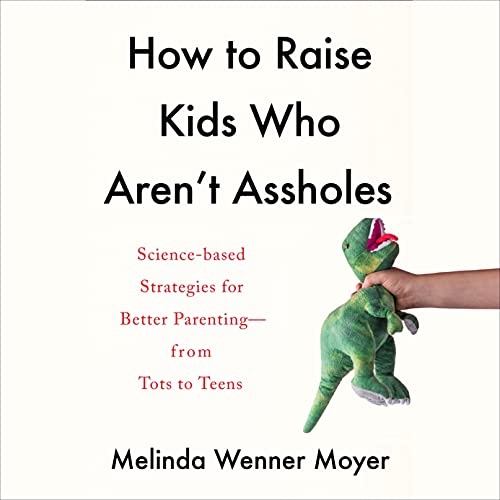
How to Raise Kids Who Aren’t Assholes: Science-Based Strategies for Better Parenting from Tots to Teens by Melinda Wenner Moyer can help just about anyone be a better parent. Like her, you are not likely to become a perfect parent with perfect kids, but you can profit from the extensive research and expert interviews she conducted. If you have kids still at home, be sure to get a copy as well as copies for any adult children who have kids.
Introduction
- Over the years, Melinda has engaged in a great deal of research in order to write parenting articles for major publications. She has found that this effort has made her a better parent. The purpose of this book is to share what she has learned with. More than anything, parents want to raise children who are kind. In surveys of what parents want their children to be, kindness comes before intelligence and work ethic. Parents play a key role, but not the only role in child development so it’s vital that their role is as positive as possible. People who are kind, helpful, and generous are happier, more successful, and make more money. (Doug: Being nice is really a selfish thing to do as if you take care of yourself, you can do more for others.)
Part I Traits
1. “It’s All About ME!” How to Raise Kids Who Aren’t (Overly) Selfish
- Kids can be very self-centered. This is natural as their frontal lobes haven’t fully developed. Start with helping kids understand their emotions and how to recognize the emotions of others. Kids with good emotional recognition generally experience better outcomes in many areas. You can ask about the emotions of characters when you read to kids or just do it in the daily run of life, including your own emotions. When you discipline a child, include emotions. Explain how emotions affect others.
- Letting kids help around the house can take more time, but it’s important. Make sure that their tasks go beyond cleaning up their room and helping everyone in the house. Look for opportunities for kids to help in the community and try to let them have some choice. Don’t just bark orders. Explain anything that you ask them to do. Be a role model. Point out the good stuff and the bad stuff that you do.
2. “This Is Too Hard.” How to Raise Kids Who Are Ambitious, Resilient, and Motivated
- In this chapter Melinda draws on the works of Carol Dweck’s Mindset and Angela Duckworth’s Grit that are both summarized here. It’s key that you compliment kids for effort rather than intelligence. If they think they are smart, they are less likely to take on challenges where they run the risk of looking “not smart.” How hard you try impacts how smart you become. Grit is a combination of passion for something, enough self-control so you work at it on a regular basis, the ability to work through and learn from mistakes, and a belief that what you are doing matters.
- You should expect your kids to pick at least one extracurricular activity each year and stick with it until the year ends. Unfortunately, some such activities are expensive. Any accomplishment tends to motivate and leads to a success spiral. Kids tend to procrastinate as their pre-frontal cortexes aren’t fully developed. Try to make tasks that seem too difficult seem fun or less scary. Help them recognize and eliminate distractions and create a good working environment. Rewards can stifle intrinsic motivation but are ok as a surprise after something is accomplished. Acknowledge their feelings and give choices when possible, even for chores. They are more likely to be motivated if they feel less controlled.
3. “You’re Dumb and Ugly!” How to Raise Kids Who Don’t Bully – and Who Help Those Who Are Bullied
- Most parents worry about their kids being bullied, but few give thought to the notion that their kids might do some bullying. Research shows that one in three do some bullying and one in six engage in cyberbullying. Bullying is a continuum, and a kid can be a bully one day and be bullied the next. Bullying is something that is repeated and deliberate, and it involves an imbalance of power. It is often done to boost social stature. Among girls, it often involves exclusion or rumor spreading. (Watch the “Mean Girls” movie with your kids.) Kids often bully as a misguided way to deal with their anger.
- Cyberbullying may have the same causes, but it differs in that it can happen at a distance any time of day, and it usually leaves a digital footprint that can be shared with parents or teachers. Bullying can also have long-term effects, such as depression and low self-esteem. Parents should talk to kids about bullying so they know it when they see it and know that it is not ok. Encourage them to do what they can to help a victim when they see bullying happen. Help them learn how to deal with anger. There is advice here for what to do if you discover that your child has been bullying others or is being bullied themselves. Schools play a big role here, so make sure your school has a plan or a program for dealing with it.
DrDougGreen.com If you like the summary, buy the book





